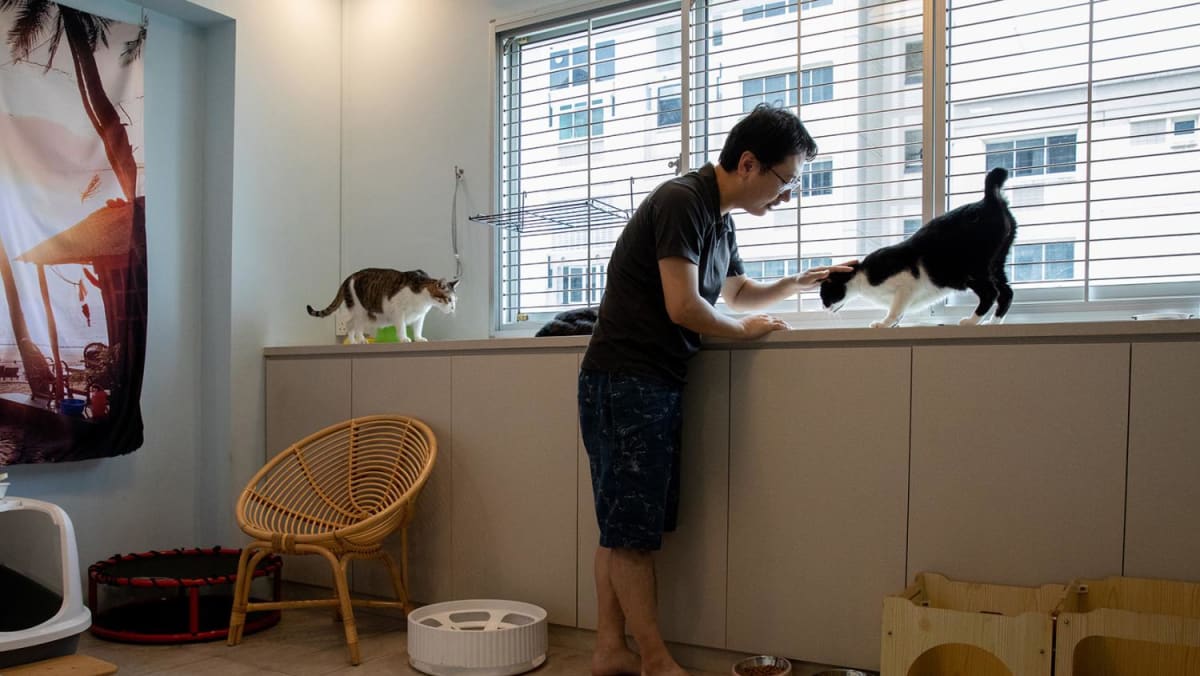
Each week, TODAY’s long-running Big Read series delves into the trends and issues that matter. This week, we look at what a new proposed framework that will allow up to two cats to be kept as pets in Housing and Development Board households means. This is a shortened version of the full feature, which can be found here.
 By
By
Nikki Yeo
After the release of results from a public consultation launched in 2022 in May this year, Senior Minister of State for National Development Tan Kiat How announced on Dec 2 a proposed cat management framework by the National Parks Board’s Animal and Veterinary Service (AVS).
When implemented in the later part of 2024, the proposal will allow up to two cats in HDB flats and introduce mandatory licensing and microchipping for pet cats.
WHY IT MATTERS
The proposal follows AVS’ public consultation exercise on the framework, which garnered over 30,000 responses from September to November last year.
Close to 90 per cent of respondents said cats are suitable pets, with most of them also supporting cats being kept as pets in HDB flats.
The survey also found that over 80 per cent agreed that pet cats should be microchipped and licensed as licencing could improve the health, welfare and traceability of cats.
In response to TODAY’s queries, HDB said it works with other agencies and animal welfare groups to engage flat owners after it receives complaints about “unpermitted and irresponsible pet ownership in HDB flats”.
Over the past three years, the number of cat-related feedback received by HDB from residents had gone down. HDB received around 1,900 cases in 2020, 1,500 cases in 2021 and 1,300 complaints in 2022.
HDB takes legal action against flat owners only as a “last resort”. Only two households have been fined since 2020 after failing to cooperate and rehome their cats which caused disamenities.
THE BIG PICTURE
Under the proposed cat management framework, AVS limits household pets to:
Two cats (and one dog of an approved breed, as per current limits) for each HDB flatThree cats or dogs, or a combination of three pets in total, for each private premiseAdditional pet licences will be subject to AVS’ approval, and HDB’s approval for HDB residents
During a two-year transition period, cat owners can apply to license and keep all existing pet cats. All pet cats will have to be microchipped before they can be licensed.
First-time licence applicants will have to complete a free online responsible pet ownership course, which will cover topics such as basic pet care skills and responsible pet ownership in the four vernacular languages.
It will be an offence to keep unlicensed pet cats after the transition period.
For married cat owners and independent rescuers Iris Ng and Than Yan Ren, the proposed cat management framework and legalisation of cats in HDB flats brings some relief.
Ms Ng, 32, a sustainability manager, said she had always been conscious of the ban, which made their decision to adopt their cat “very stressful”.
The ban imposed challenges such as difficulty securing pet insurance as some insurers do not allow a cat owner’s listed address to be a HDB flat and social concerns of being unable to openly establish a cat owner community in her neighbourhood.
On the cap of two cats per household, AVS director Audrey Chen, said that the proposed limit was based on “assimilating the information” from public feedback and the need to balance preferences.
Ensuring that the community “remains harmonious” is a priority and while there are no immediate plans to change the proposed limit, AVS would be open to feedback and review depending on the future landscape, she said.
On why mandatory sterilisation is not a proposed licensing condition for cats, Dr Chen said AVS “strongly encourages” sterilisation as it recognises the health and behavioural benefits of the procedure.
Under the proposed framework, sterilisation is incentivised during the two-year transition period, where cat owners who sterilise their cats will have free cat licences with lifetime validity.
Those who do not sterilise their cats will have to regularly renew their licences at a higher fee following the two-year transition period.
Dr Chen said AVS would take a “stepwise approach” to allow cat owners to adjust to the proposed changes, and review the framework based on the survey results and during its implementation over the next few years.
The public can share feedback on the proposed framework through an online survey at https://go.gov.sg/cat-framework until Feb 1 next year.